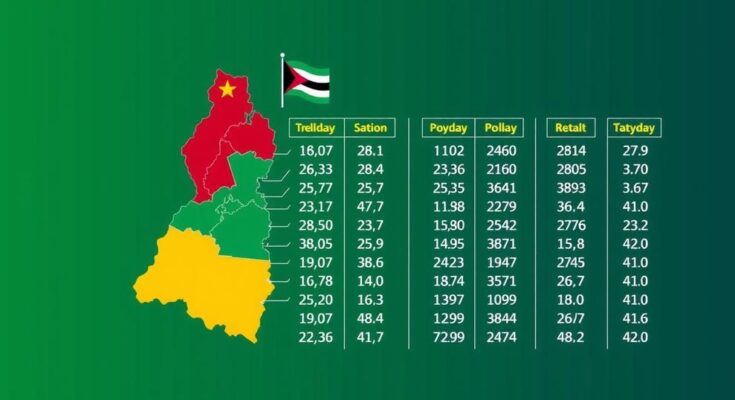The Botswana Democratic Party (BDP), in power since independence in 1966, has been ousted by the Umbrella for Democratic Change (UDC) in recent elections. This political transition reflects widespread public discontent due to economic challenges, particularly in the diamond sector. Unemployment rates are surging, and the government has faced criticism over its responses to these issues. The new administration, led by Duma Boko, promises to implement reforms focused on job creation and economic diversification.
In a remarkable turn of events, the Botswana Democratic Party (BDP), which has maintained a continuous hold on power since the country’s independence in 1966, has been unseated in the recent elections. The opposition coalition, known as the Umbrella for Democratic Change (UDC), spearheaded by its presidential candidate, Duma Boko, has claimed victory, marking a historic milestone in Botswana’s political landscape. This transformation raises significant questions regarding Botswana’s trajectory as the nation encounters pressing economic difficulties and ambitions for a more diversified economic structure. Traditionally, Botswana, home to a population of approximately 2.5 million, has enjoyed stability and prosperity, largely due to its abundant mineral resources. Nevertheless, recent electoral results indicate a growing disaffection among the electorate with the prevailing political dynamics. The UDC’s alliance of opposition parties captured 28 out of 61 parliamentary seats, signaling a clear departure from the BDP’s longstanding dominance. Preliminary count results indicate that opposition parties secured a majority of the constituencies in contention, further consolidating their legislative power. Under the presidency of Mokgweetsi Masisi, the BDP faced escalating scrutiny over its inability to diversify the economy, a reliance that has become increasingly untenable following a downturn in global diamond demand. Given that diamonds contribute over 80 percent of Botswana’s exports and constitute a quarter of the GDP, the repercussions of falling prices have led to soaring unemployment rates exceeding 27 percent. Young citizens are particularly affected, emphasizing the urgent need for alternative economic strategies—a challenge that the BDP has attempted to address, albeit unsuccessfully. During the campaign, President Masisi acknowledged the need for policy reforms. However, voters largely perceived the government’s responses to the economic crisis as inadequate. An analysis by Bongani Malunga highlights several critical issues leading to the BDP’s defeat, including rampant unemployment, medical supply shortages, low minimum wages, and struggles faced by entrepreneurs. These factors culminated in a growing dissatisfaction among the populace regarding basic life necessities. Mr. Boko, a seasoned politician and lawyer, has utilized this public sentiment to advocate for change. His leadership within the opposition coalition has surged over the past elections, underpinning a narrative of transformation and renewal amid the current economic landscape. He has pledged to implement a comprehensive approach aimed at economic diversification, job creation, and improvements in healthcare and education. In reflecting on this electoral loss, President Masisi conceded at a press conference, “We got it wrong big time in the eyes of the people. We were really convinced of our message. But every indication, by any measure, is that there’s no way that I can pretend that we’re going to form a government. I will step aside.” This admission underscores the BDP’s failure to sufficiently meet the aspirations and needs of its citizens, as highlighted by Mr. Malunga, who notes that the BDP’s earlier promises of safeguarding citizens’ rights were perceived as unfulfilled. As Botswana embarks on this new political chapter under the leadership of the UDC, the incoming administration’s commitments to enhancing job prospects and addressing youth unemployment will be critical in shaping the nation’s future. The UDC’s platform proposed progressive changes, including the development of innovative opportunities for the youth, suggesting a potential shift towards a more inclusive economic model. With this new government, citizens are poised to witness an agenda aimed at tackling the existing socio-economic challenges head-on, paving the way for a hopeful and dynamic future for Botswana.
The recent elections in Botswana marked a drastic political change as the long-standing ruling party, the Botswana Democratic Party (BDP), was unseated by the Umbrella for Democratic Change (UDC), an opposition coalition. Since independence in 1966, the BDP has held power, making this defeat particularly significant in Botswana’s political history. As the nation now grapples with the aftermath of this political shift, it becomes essential to consider the underlying economic issues that contributed to this transition, including high unemployment rates, economic dependency on diamonds, and public discontent with the government’s response to these challenges. Understanding these complexities will offer insights into Botswana’s future direction under new leadership.
The electoral victory of the Umbrella for Democratic Change marks a pivotal moment in Botswana’s democratic evolution, reflecting the electorate’s desire for change amid prevailing economic difficulties. The BDP’s failure to address critical issues such as unemployment, healthcare access, and economic diversification significantly contributed to their defeat. As the new administration led by Duma Boko takes office, the commitment to tackling these challenges and prioritizing the welfare of Botswana’s citizens will be crucial for the nation’s development moving forward. The transition of power sheds light on the electorate’s expectations and sets the stage for potential reforms in governance and economic policy.
Original Source: www.theeastafrican.co.ke




